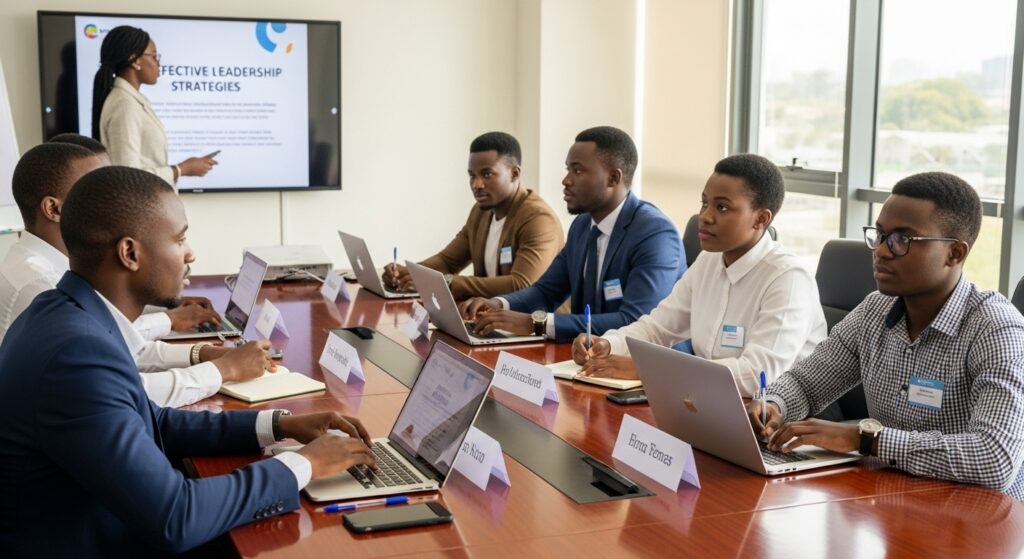Not every opportunity to level up comes with a degree certificate. In fact, some of the most transformative experiences African students and young professionals can access don’t happen in classrooms — they happen in fellowships, leadership retreats, policy labs, and entrepreneurship accelerators.
These are the spaces where ideas turn into impact, where connections become collaborations, and where talent gets a shot of jet fuel.
If you’re a student or young professional looking for opportunities to grow, build networks, and contribute to your field, short-term fellowships and leadership programs are exactly where you should be looking.
They won’t just pad your CV — they’ll give you clarity, confidence, and direction.
Why Short-Term Fellowships Matter (Even Without a Degree)
Let’s be honest: not everyone can afford to pause life for two years to get a master’s abroad. And not every big idea needs a PhD to make it real. Short-term fellowships are the bridge between education and impact.
They give you:
- Access to mentors and experts
- Exposure to new ideas, industries, and countries
- Time and space to explore leadership, policy, innovation, and social change
- A prestigious badge of credibility (and yes, this helps on your LinkedIn)
Best of all, many are fully funded, and you don’t need to be a genius or billionaire’s child to get in — just intentional, curious, and driven.

1. Mo Ibrahim Leadership Fellowships
- Duration: 12 months
- Host Institutions: African Development Bank (AfDB), International Trade Centre (ITC), United Nations Economic Commission for Africa (UNECA)
- Coverage: Monthly stipend, relocation, living expenses
- Target group: Young Africans under 35 with at least 7 years of work experience
What it offers:
This prestigious program places fellows at high-level institutions working directly with top executives on governance, policy, and development strategy.
Why it matters:
You don’t just attend workshops — you’re in the room where things happen. And when you leave? You’ll have a leadership resume that screams “credible.”
2. YALI Regional Leadership Centers (RLCs)
- Duration: 5–12 weeks
- Locations: Ghana (West Africa), Kenya (East Africa), South Africa (Southern Africa)
- Coverage: Fully funded training, accommodation, meals
- Eligibility: African citizens aged 18–35
Overview:
A U.S. government initiative, the Young African Leaders Initiative trains emerging African leaders in business, public policy, and civic leadership.
What makes it special:
It’s pan-African, fast-paced, and deeply practical. You meet peers from across the continent, work on real problems, and leave with a network that actually matters.
Bonus:
Alumni get access to grants, internships, and even funding for projects post-program.
3. Harambe Entrepreneur Alliance Fellowship
- Focus: Young African innovators building ventures for the continent
- Duration: Ongoing fellowship with training sessions and retreats
- Perks: Access to seed funding, elite investor networks (including Google, Bretton Woods, Cisco), and Ivy League resources
What’s different:
Harambeans, as they’re called, are entrepreneurs first — often building scalable startups in healthtech, fintech, education, and agriculture.
This is for you if:
- You already have a startup or social enterprise
- You think big (we’re talking continent-scale impact)
- You want access to funding and global mentors without selling your soul
4. Obama Foundation Leaders: Africa
- Duration: 6 months (virtual and in-person components)
- Eligibility: Ages 24–45, with demonstrated impact in community or career
- Coverage: Training, mentoring, regional networking, project development support
What’s it about?
It’s less about politics, more about values-driven leadership. You’re selected not because of your job title, but because of what you’ve already done.
Why it matters:
It opens doors to international conversations, access to world-class coaches, and — let’s be honest — being “an Obama Foundation Leader” sounds awesome.
5. Atlas Corps Fellowship
- Duration: 12–18 months (blended format)
- Location: Remote or U.S.-based host organizations
- Coverage: Living stipend, visa support, global network
- Eligibility: 2–10 years experience in social impact, fluent in English
What’s unique:
It’s very global. You’ll work remotely or in-person with an international NGO or nonprofit, contribute your skills, and collaborate across continents.
Focus Areas:
Technology for social good, youth development, education, gender equity, and nonprofit leadership.
6. African Changemakers Fellowship
- Duration: 4 weeks (virtual), with alumni activities
- Cost: Free
- What it is: A leadership bootcamp for young Africans working in entrepreneurship, activism, and development
Why apply:
This is a grassroots, Africa-first initiative that focuses on practical leadership, storytelling, project design, and collaboration.
Added value:
It’s flexible, interactive, and creates a genuine community — not just a temporary cohort.
7. Canon Collins Trust Scholarships for Leadership Development
- Focus: Southern African students in law, social justice, and public policy
- Duration: Postgraduate fellowships, networking events
- Coverage: Tuition support, mentorship, leadership seminars
Why it matters:
If your work intersects with human rights, equity, and justice, this fellowship builds your capacity, supports your education, and connects you with change-makers in southern Africa.
What Makes You a Strong Fellowship Candidate?
Honestly? It’s not about perfect English or knowing the name of every African president. It’s about being real, focused, and active in your space.
The best candidates:
- Have already started something — a club, an NGO, a tech project, a campaign
- Can reflect on their failures and growth
- Aren’t afraid to talk about what matters to them
- Write a personal statement that makes you feel something
Fellowships love people with stories. Make yours resonate.
How to Prepare a Winning Fellowship Application
Let’s keep this simple. Here’s your Fellowship Prep Toolkit:
- Impact Resume: A CV that highlights what you’ve done, not just what you studied
- Motivation Letter: Why this fellowship, why now, and what will you do with it
- Reference Letters: From mentors or colleagues who’ve seen you lead, build, or serve
- Portfolio (if applicable): Document your work — articles, apps, reports, campaigns
- LinkedIn Profile: Yes, people check. Make sure yours isn’t a desert of bad selfies and outdated job titles
Final Thoughts: Degrees Are Great — But Action is Better
If you’re still waiting for that fully funded PhD before you start your impact journey, this is your wake-up call. The world needs your ideas now.
Short-term fellowships are the testing ground. The lab. The bootcamp. The place where you get sharper, braver, and better-connected — all without going broke or disappearing into academia for five years.
So apply. Even if you don’t feel ready. Especially if you don’t feel ready.
Growth doesn’t come from knowing everything. It comes from showing up.


